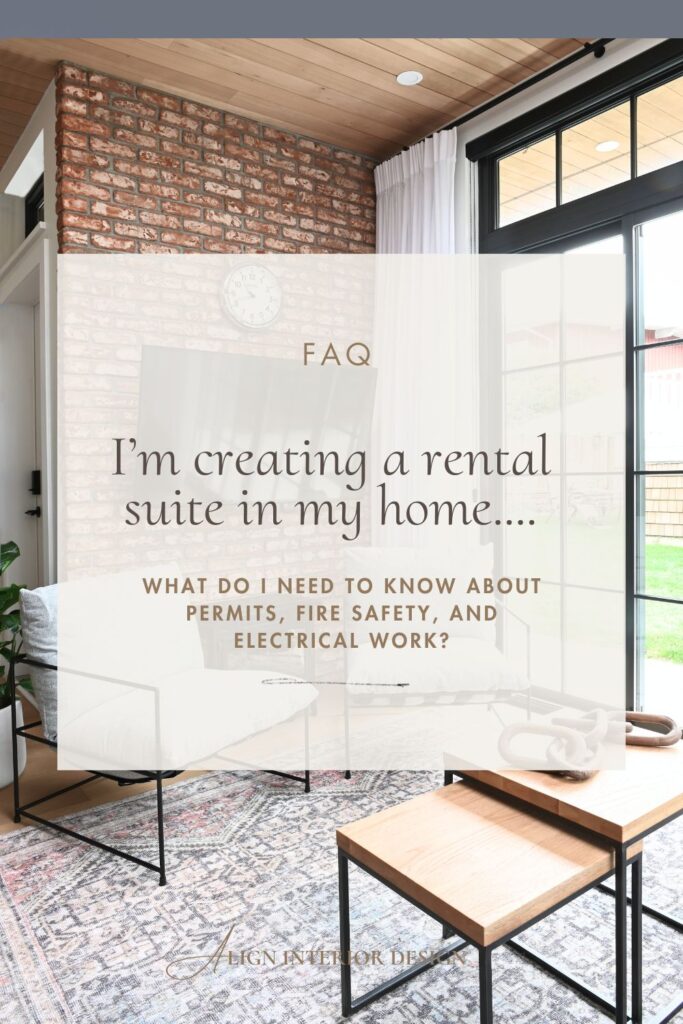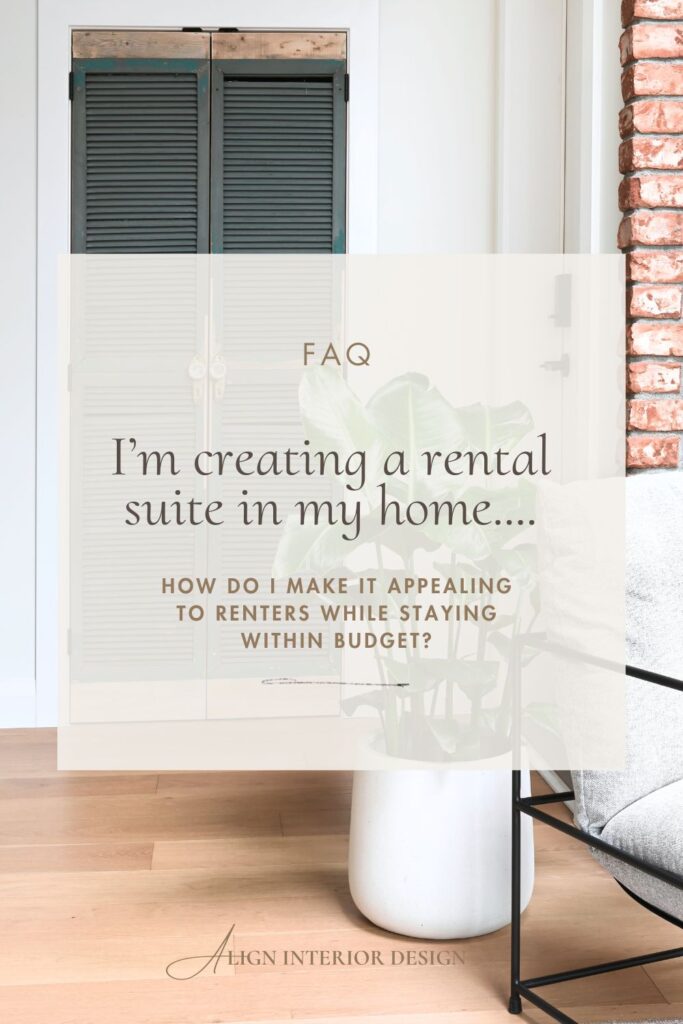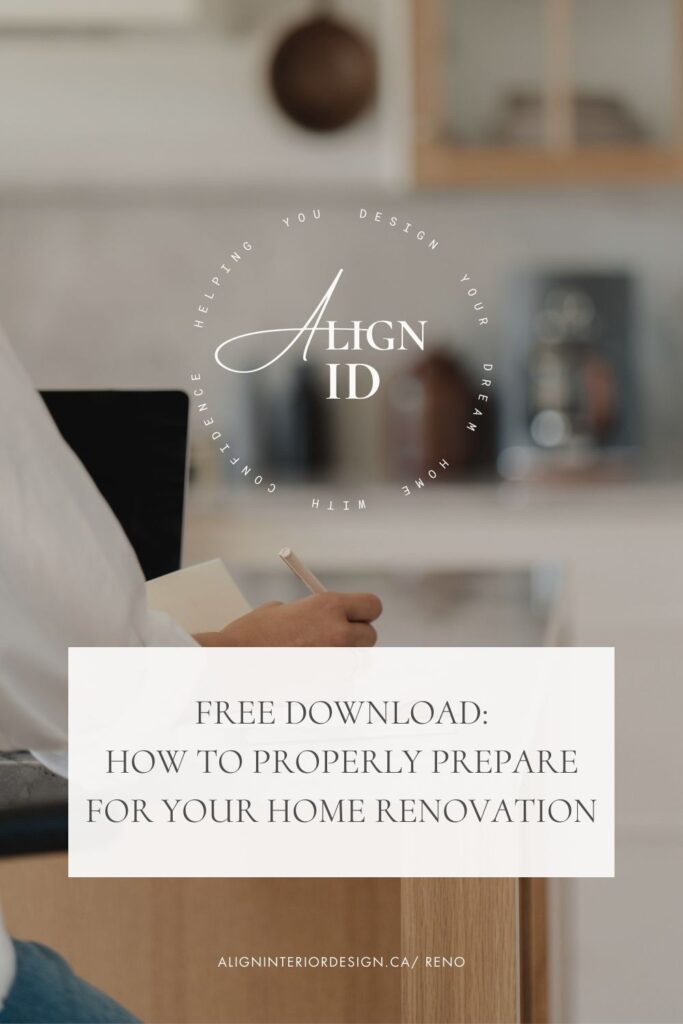Every homeowner reaches a point where they start wondering, How can I get more from my home? Whether it’s turning your basement into a rental suite for extra income, expanding to fit a growing family, or planning for the future, these big decisions come with even bigger questions. Today, I’ve teamed up with Quay Construction to answer some of the top questions homeowners have about major home investments—like legalizing basement suites, budgeting for additions, and future-proofing your forever home.

Legalizing Your Basement Suite – Steps to Kick-Start Your Project
What steps do I need to take to legalize my basement suite, and how can I ensure it’s a smart investment?

Legalizing a basement suite is more than just a paperwork process; it’s a series of strategic steps that set the foundation for a successful project. Here’s what Quay Construction recommends to get your basement renovation on the right track:
- “Have the site professionally measured.”
- “Ask your design team to create existing and proposed plans for your project.”
- “Review the proposed plans to ensure they meet your requirements.”
- “Have your design and construction team obtain all necessary permits from the City prior to starting work.”
To ensure it’s a worthwhile investment, they add: “Engaging an experienced designer and contractor is key early on in the process. Your designer can help you select specifications that will help you optimize your budget, whilst creating a suite that’s appealing to a vast majority, reducing your vacancy rate and maximizing your rental income. Your contractor can help in designing a rental suite that will optimize your budget in terms of services and legal suite requirements such as location of plumbing shut-offs, electrical panel, and demising walls and entry for the legal suite.”
Essential Requirements for a Rental Suite: Permits, Fire Safety, and Electrical
What should I know about creating a rental suite in my home, including permits, fire safety, and electrical work?

Creating a rental suite is about building a safe, compliant space that feels like a home of its own. “Think of a legal suite as a separate home that happens to share walls with your principal residence. All the walls and doors between the two units need to have sufficient fire separation, and the unit needs to have its own electrical panel and plumbing shut-offs. Due to the nature of work involved in achieving this, a building permit is required, in addition to trade permits, such as electrical and plumbing.”
Budget-Friendly Tips to Attract Renters
How can I make my basement suite appeal to renters while staying within budget?

Once the paperwork and permits are out of the way, it’s time to think about creating a space that renters will love—and one that fits your budget. The team says, “A great design always goes a long way. Depending on the aesthetics of your neighbourhood and potential renter pool, specifying finishes that would appeal to the majority in your neighbourhood is always a great idea. Collaborating with your renovation contractor from early stages of the planning phase will allow them to help you with choosing materials that fit your aesthetic and budget.”
By focusing on finishes and layout that appeal to a wide range of renters, you can keep vacancies low and your rental income steady without overspending.
Planning an Addition: Tips to Avoid Budget Overruns
I’m planning an addition. What should I be aware of to prevent budget overruns?

If you’re thinking of expanding your home, you probably know that managing the budget can be tricky. The key? Planning for the unexpected. “Having a contingency plan is always a great idea. Setting aside 5-10% of your project budget as contingency will ensure that your project won’t go over budget if you encounter surprises along the way.”
An addition can add significant value to your home, but it’s essential to have that extra cushion in place. With a little forward planning, you can help avoid any big financial surprises down the road.
Future-Proofing Your Home for Potential Expansions
What are some design strategies to future-proof my home for potential expansions or additions?

Expanding your home may be part of a bigger plan to create a space that’s adaptable to your future needs. Homes that are designed with flexibility and growth in mind become more valuable over time and adapt seamlessly to changing needs.
- “Open floor plans typically lend themselves best for future expansions, as the areas can later easily be demised as needed.”
- “Having high ceilings in the basement and garage is also very helpful, as it allows your home to be expanded on easier in the future.”
- “Entry/Exit door placement and deck structure and sizing can also save you both time and money.”
Phased Renovations: Maximizing Your Investment
If I plan to renovate in phases, how can I ensure I’m maximizing my investment?

For some homeowners, a phased renovation makes sense financially and logistically. Renovating in phases lets you balance immediate needs with future goals, but it requires careful planning. “Thorough planning is extremely important when renovating in stages. Phasing out the project in a way to eliminate rework is essential to maximize your budget. Each phase should be completed at a point where the unit is fully livable in a safe manner and ideally without having to remove or replace anything at the start of the following phase. Specification selection and procurement planning are also important, especially if there will be a large time gap between the various phases of the project.”
By planning each stage, you ensure that every step adds value without unnecessary expense. A phased approach done right can lead to a more comfortable home without breaking the bank.
Designing a Forever Home for Aging in Place
What should I consider when planning our forever home for aging in place?

When your home is your “forever home,” planning for aging in place is a smart choice. Making your home accessible for future needs ensures that it can adapt with you over the years.
- “Unit Entry – should be accessible without the need to climb stairs, ideally through ramps or sloped walkways, if not located on flat ground.”
- “Flooring – all flooring should be installed level, using anti-slip materials to minimize fall hazards.”
- “Access / Egress – wider doorways and hallways are always a good idea, raising the typical 30” standard to 32” – 36” for ease of passage.”
- “Bathroom – upgrades such as planning for and installing a higher toilet, grab bars in the shower and near the toilet, smooth floor transition at bathroom entry, and installing a curbless shower.”
- “Kitchen – Counter height should be easily accessible. Going an inch or two below standard can be helpful in the future. Adding smart storage solutions such as pull-out shelving throughout is a great way to eliminate awkward movements.”
These thoughtful features make your forever home safer and easier to navigate as you age, ensuring comfort for years to come.
Final Thoughts
“Planning a smart investment in your home requires having the right strategy in place. Planning a kitchen renovation is vastly different than building a rental basement suite. Having an experienced team around you to guide you through the process from the early stages is key. The right design and construction team can help you optimize your budget, time, and quality.”
A special thank-you to Quay Construction for sharing their insights and practical advice on how to get the most from your budget, time, and quality in any home project.
Whether you’re building a legal rental suite, planning an addition, or future-proofing your forever home, every decision adds value when you plan ahead and consult experts. Investing strategically means creating a home that serves you well today and long into the future.
Get Our Free Download!
Before you start hiring, make sure you’ve set your project up for success. Download our free guide: The 6 Steps to Take BEFORE Hiring for Your Renovation to give your project the best start.
We hope this post provides you with the information and inspiration you need to move forward with confidence in your home project, if you are interested in learning more about the home renovation process check out our additional blog posts below.
Check out these blog posts next:
- Questions to Ask Contractors About Renovation Budgets
- Essential Questions to Ask Your Interior Designer – Part 1: Before You Renovate Your Home
- Navigating Your Home Project: Who Should I Hire First – Designer, Builder, or Architect?
Happy renovating!

